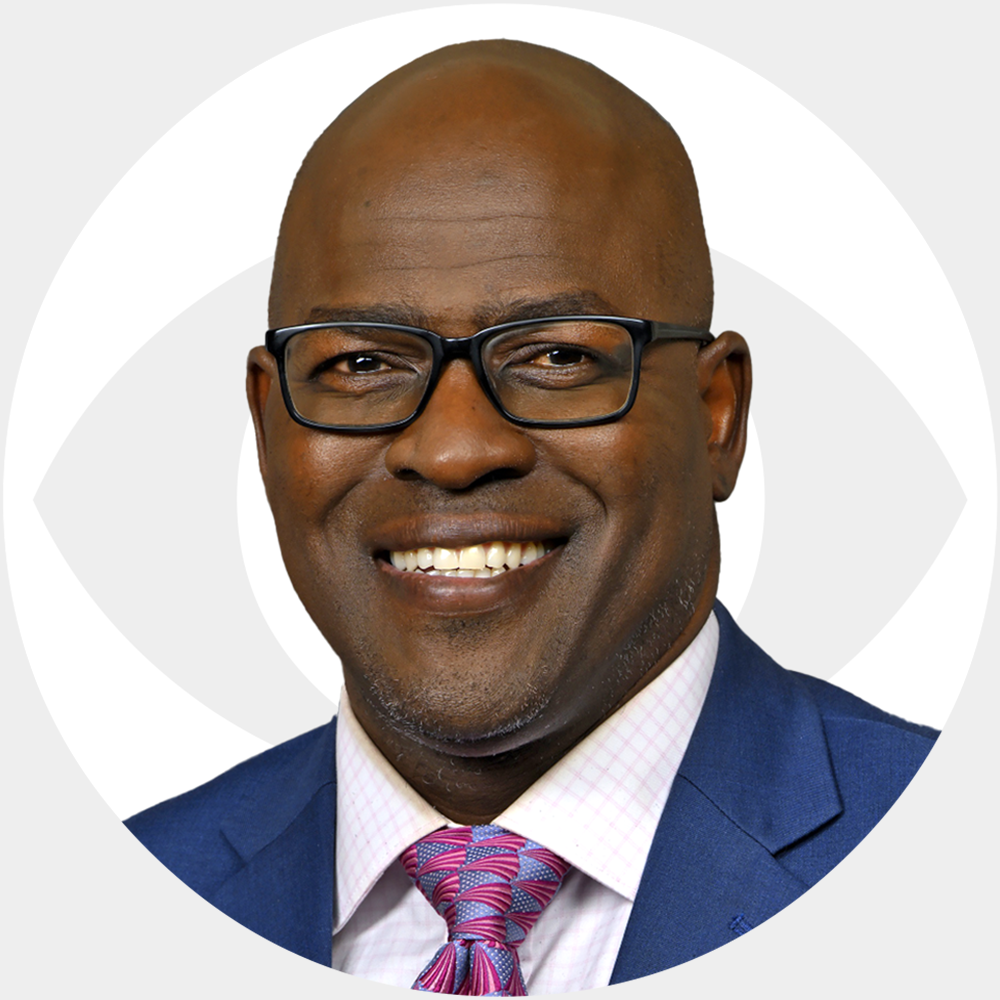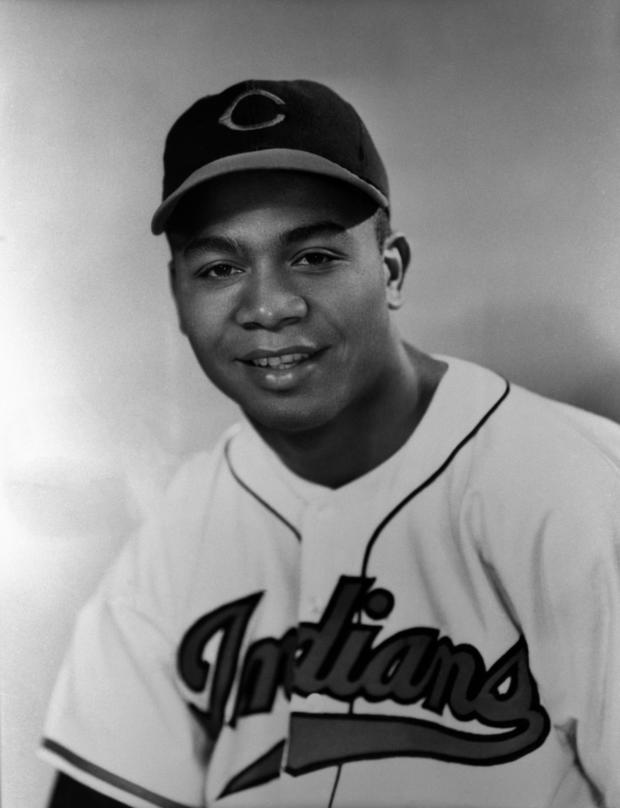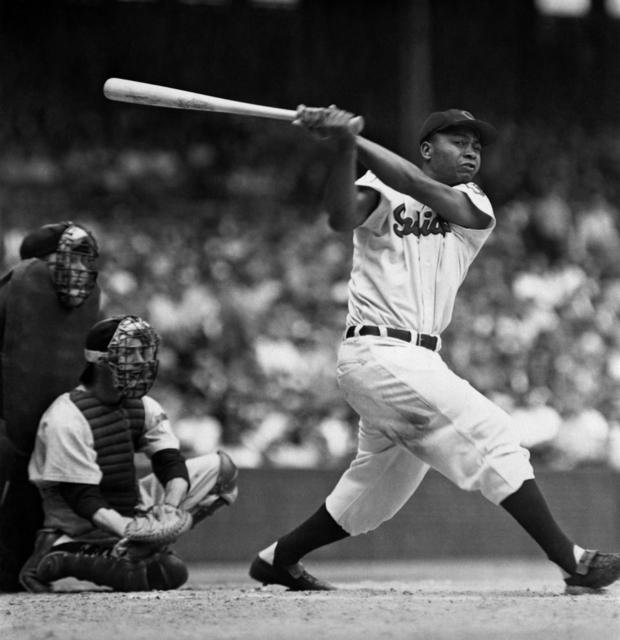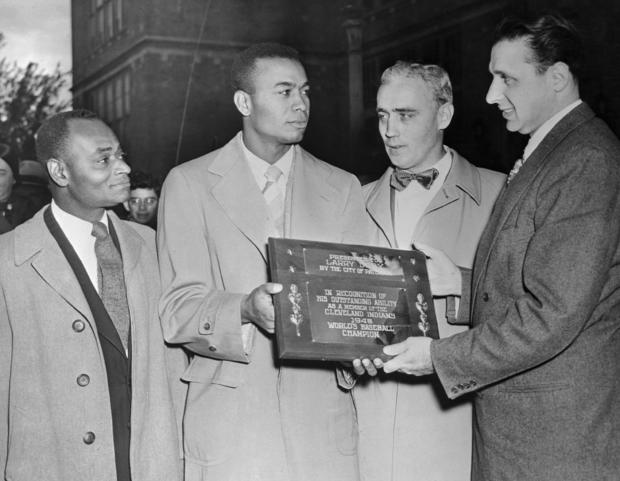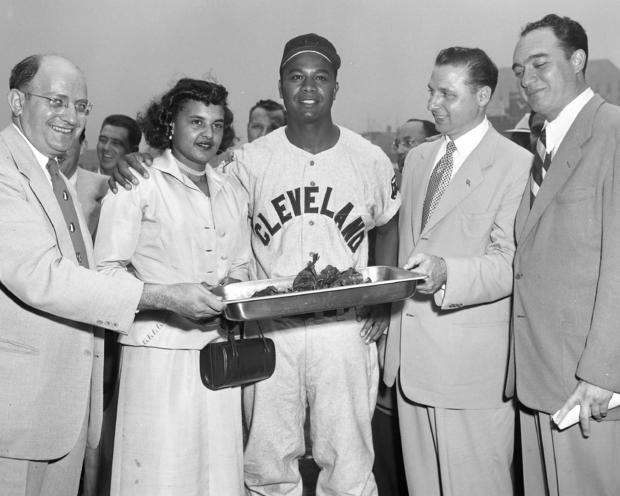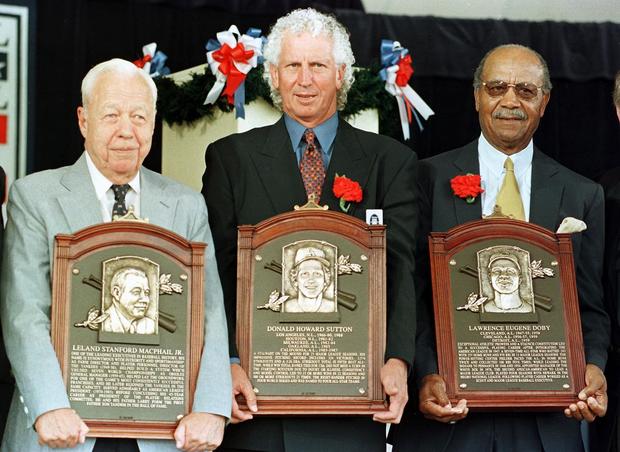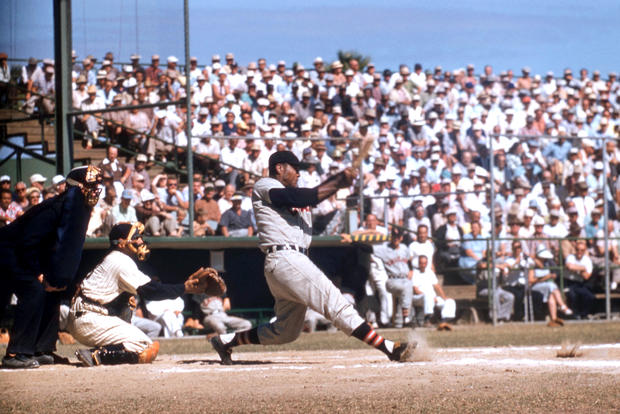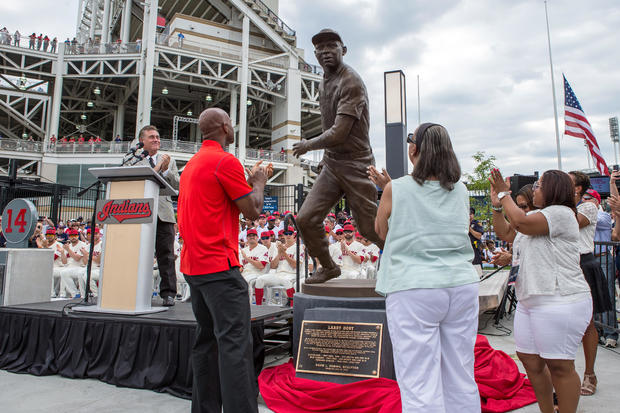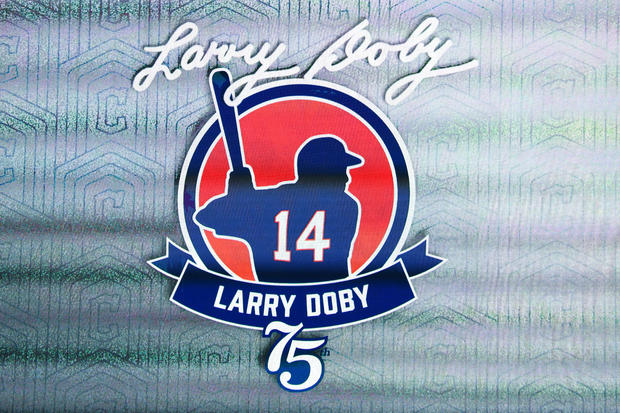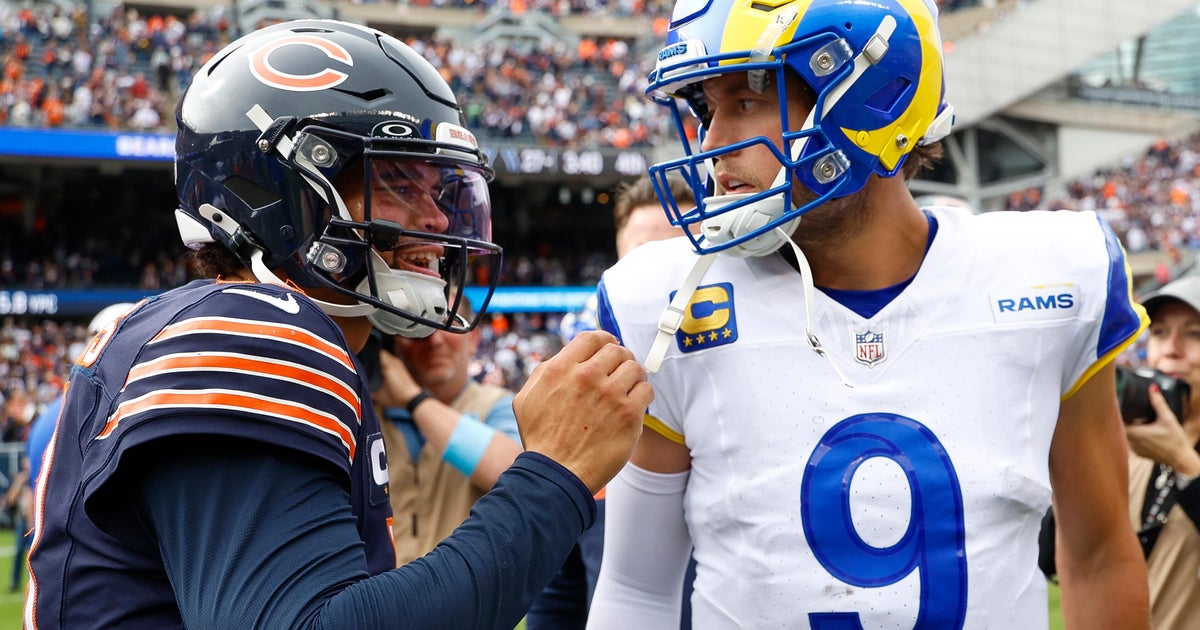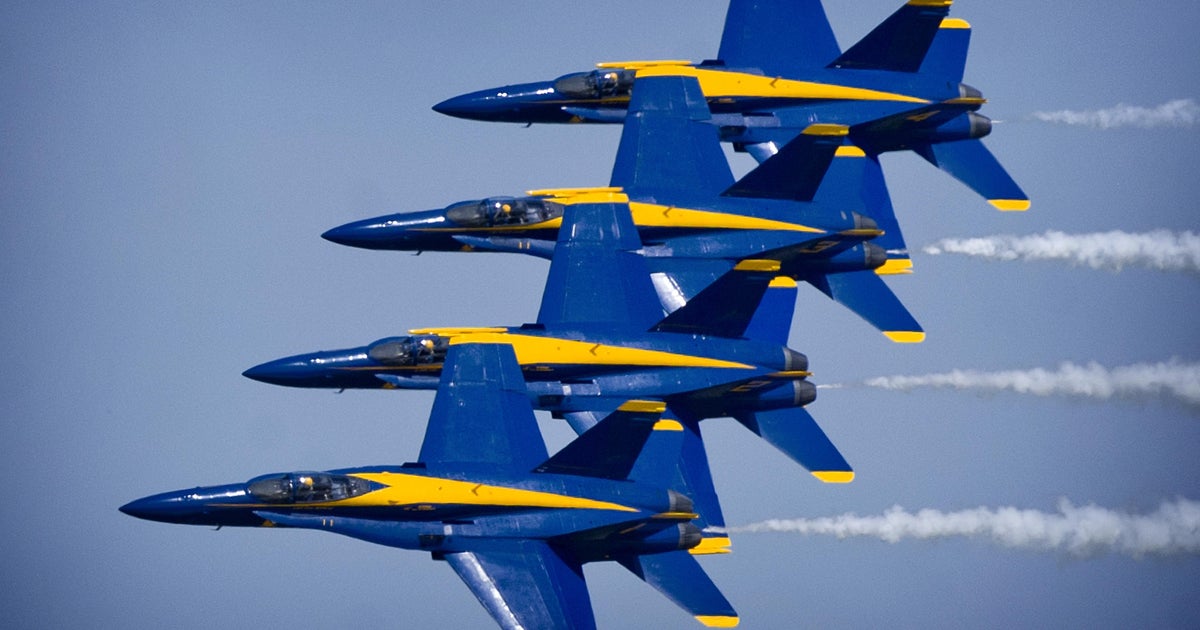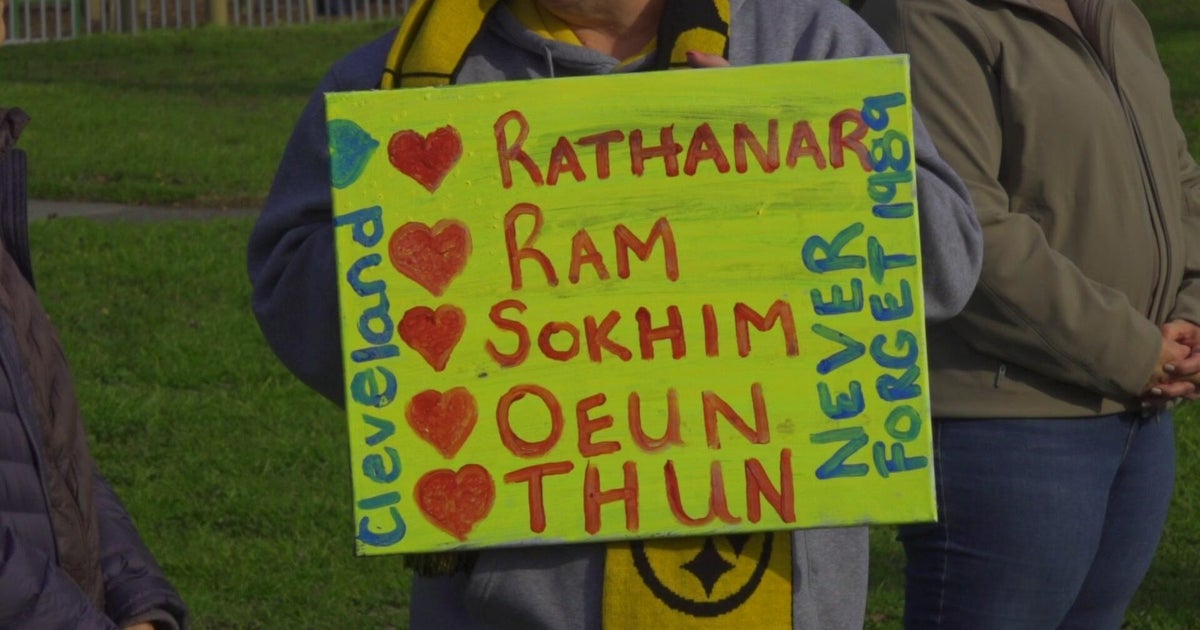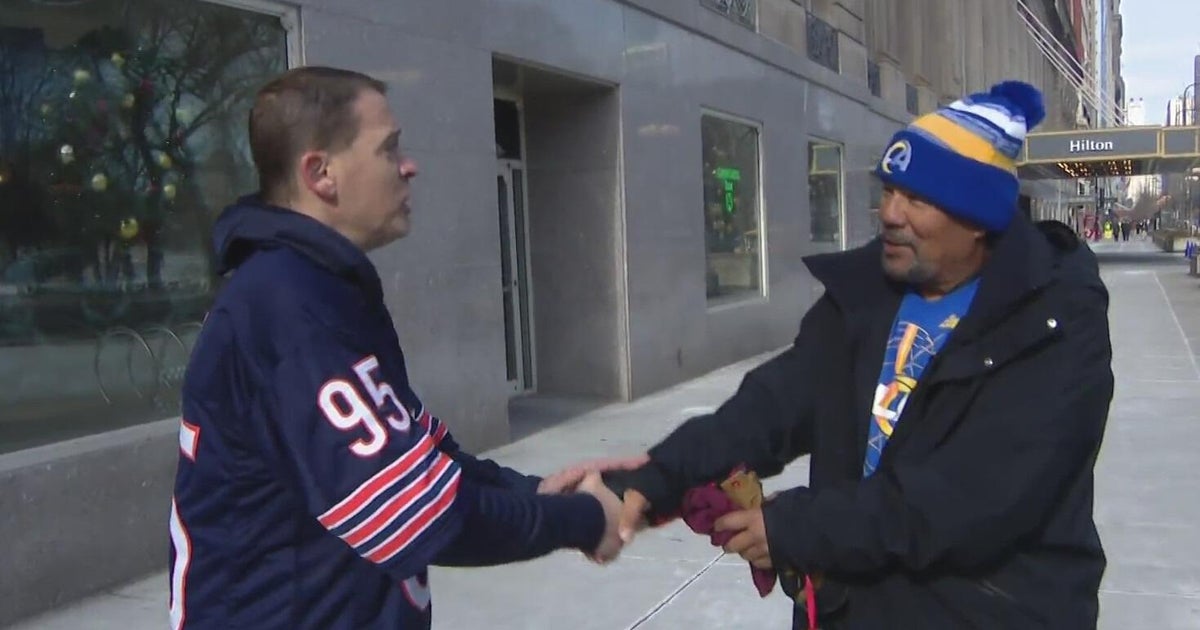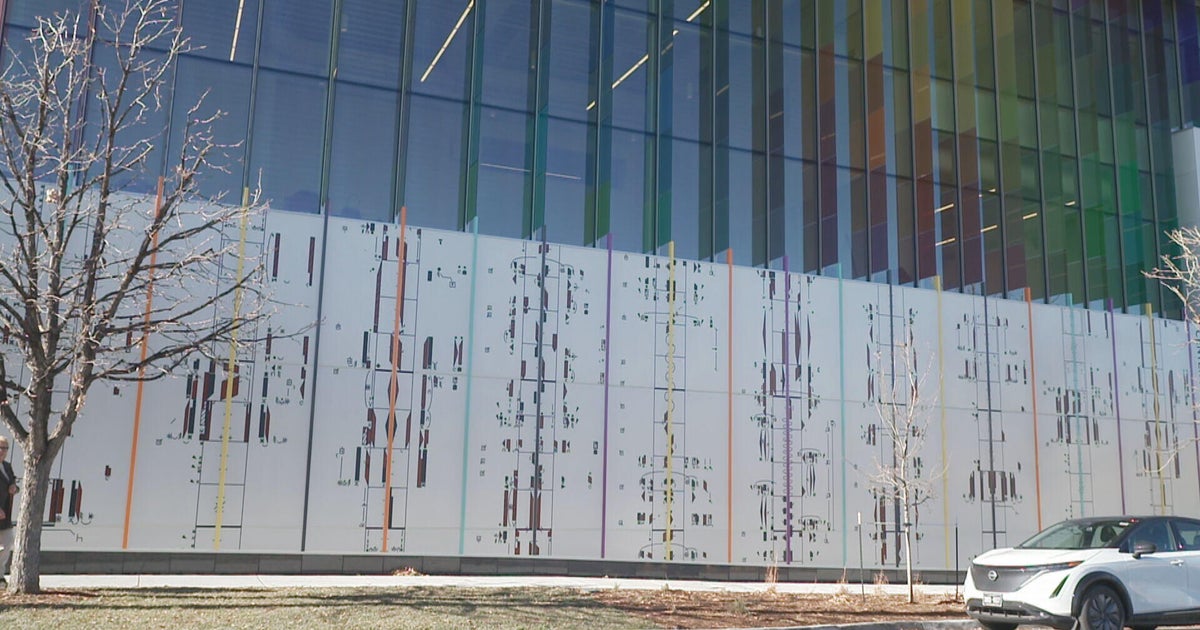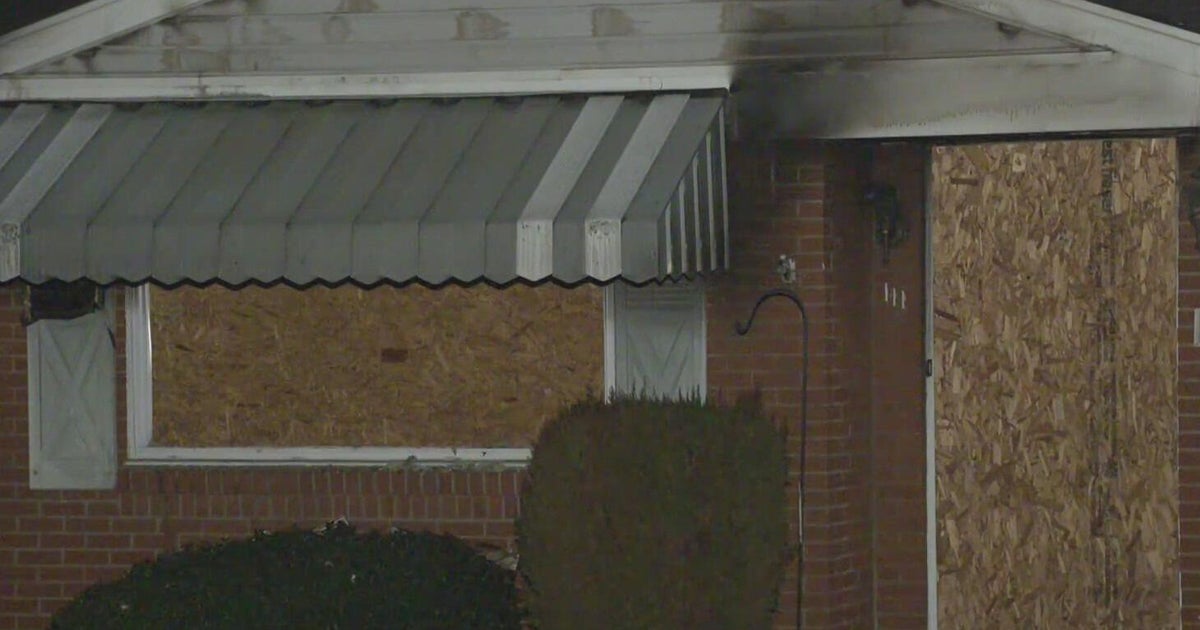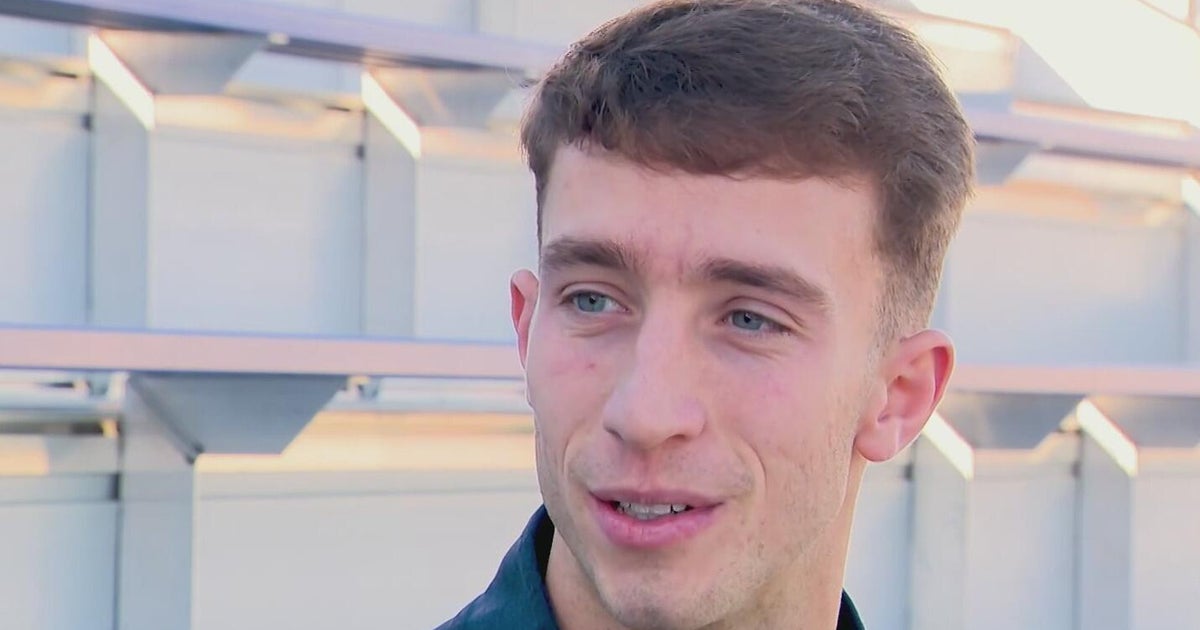"Larry Doby: Second to none" - Watch our special presentation
PATERSON, N.J. -- Seventy five years ago, Jackie Robinson broke Major League Baseball's color barrier making America's pastime truly a game for all Americans. But Jackie was wasn't the only Negro League player to play in the majors in 1947. Just three months later Larry Doby joined him. Jackie Robinson with the Brooklyn Dodgers, Larry Doby with the Cleveland Indians. Major Legaue Baseball was fully integrated.
But, unlike Jackie, Larry's journey to the majors was not as carefully planned.
Larry Doby's life would completely change on July 4th, 1947, when he would go from the the Newark Eagles of the Negro Leagues to the Cleveland Indians of the American League.
"Larry Doby was a big star for the Newark Eagles of the Negro National League. Between games of a doubleheader... he was whisked off to Chicago on the overnight train. At Chicago, he meets Bill Veeck... a couple of hours later, he goes to bat in Comiskey Park... integrating the American League. It's very hard to fathom just how astounding that might have been for Larry Doby," said Doby biographer Joseph Moore.
That first day in the big leagues on July 5th would not go as Doby dreamed. While his teammate and manager welcomed him as a ballplayer who earned his way into the big leagues, some teammates refused to embrace him as part of the club.
"His manager was Lou Boudreau... Boudreau didn't even really understand that this Black man was coming to his team. And so he meets larry doby and welcomes him, and then tries to introduce Doby to his teammate - some of whom refuse to shake his hand. Others turn their backs on him," Moore said. "Some of these ballplayers are Southerners. They're accustomed to Jim Crow behavior - they don't want to see a Black man on their team. And for some of them, 'Who is this man - he's going to be a rival for my position.' And so there is some reluctance on that basis."
On the field, fellow Cleveland players refused to play catch with him. It wasn't until future Hall of Famer and former Yankees MVP and 4-time World Series champion Joe Gordon stepped up, and was a true teammate.
"The Yankees were always held in high esteem back then. So for a Yankee to, kind of, come up and befriend him, show the other people hey, listen, this guy's here and let's give him a chance, and let's see what he has," said his son Larry Doby, Jr.
Doby got just one at bat in the game and struck out. That first at bat against the White Sox was a precursor for a season of struggles. Not just on the field, but off the field, as he dealt with racist slurs from the crowd and segregation at hotels and restaurants.
"He dealt with the same kinds of things that Jackie faced. Larry faced them, and he may have faced even more."
For all of 1947, Doby was the only African American player on the Cleveland Indians, while the Dodgers added a second player from the Negro Leagues in August of that year. So, for Doby, Jackie Robinson the only man who knew what he was going through. and was a lifeline to help him deal with the pressures of baseball and society.
"He and Robinson would occasionally talk on the telephone at night, and they would share some of their experiences. Robinson is in the National League and Doby's in the American League. They had a lot of similar experiences with racism, with the hatred directed toward them. I think that Doby appreciated what Robinson was doing, and that he was doing it in his own way," Moore said.
"He dealt with the same kinds of things that Jackie faced. Larry faced them, and he may have faced even more. You can make an argument that he went through just as much, perhaps even more, because he's playing in American League," said Bob Kendrick, president of the Negro Leagues Baseball Museum. "Brooklyn was a far more urban center than Cleveland. Cleveland certainly had its fair share of Black folks, but not nearly the urban center that Brooklyn was."
"Larry Doby was 23 years old - literally thrown into a powder keg of racism, at 23. Jackie was 28, far more experienced. Larry, 23, even though he had served his country as well. He's still just a baby. And he's thrown into this situation. And he handled himself with the same grace, class and dignity that we now continually celebrate Jackie for," Kendrick added.
The struggles of 1947 on their field were wiped out by a one-of-a-kind season in 1948. Doby's first full season in the bigs was capped off with his own firsts in baseball. On October 9, 1948, in game four of the world series against the Boston Braves, Doby became the first African American to hit a home run in the World Series. It would end up being the game winner, and lead to an image that America had never seen. Along with his teammate Satchel Paige, Doby would be the first African American to win a World Series title after they beat Boston in six games.
In 17 seasons in the Major and Negro Leagues, Doby twice led the American League in home runs, once in RBI and runs. Doby finished with a career .288 batting average, 273 home runs and played in nine All Star games. He was just one of 3 players to win a World Series in the Negro and Major Leagues, and finally in 1998 followed Robinson again - this time into the Hall of Fame, as the man who integrated the American League was given his due for holding the door open for those who followed him.
"Doby and Jackie Robinson deserve co-equal consideration. I mean, it was just 11 weeks between one and the other, and integrating baseball," Moore said. "This in no way diminishes what Robinson did... he was first. There's no there's no taking that away... but he had an equal partner very, very soon."
Larry Doby passed away in June of 2003 in his adopted home state of New Jersey. He may have been born in South Carolina, but he went to Eastside High School in Paterson, and later raised his family in and around Paterson. Livingston recently had the opportunity of meeting up with his namesake Larry Doby, Jr. in the park named after his father.
"When did you realize that your dad was a big deal, that he was such an important part of American history? Not just baseball, but American history, civil rights movement, et cetera?" Livingston asked.
"I think as I got older, I realized the impact that, you know, his career had on baseball and on America. But as a kid, you know, it's just your dad, and he wasn't playing when I was, you know, a little kid, so I never saw him play. But as you get older and, you know, you kind of become a little bit more knowledgeable about the world, you realize that you're very fortunate that your dad broke some barriers and made it possible for others to come after him," Doby, Jr. said.
"We have heard heard about Jackie Robinson being temperamental responding to white officials and people of that nature, which was important at that time. What type of man was your dad that made this such a success?" Livingston said.
"His fire burned within. He was the quiet guy who tried to lead by example, and that that's what he did. Jackie Robinson was a little bit more fire, but we needed somebody like that. I think the fact that one of them was like my dad and one of them was like Mr. Robinson, I think it worked well. I think if both of them were like my dad, it wouldn't have been good, or if both of them were like Mr. Robinson, it wouldn't have been good. The fact that they had two different personalities that kind of, you know, with the ying and the yang, I think it worked out pretty good," Doby, Jr. said.
"Was there ever an ounce of animosity towards Jackie Robinson being the first and getting all the accolades that he did and maybe feeling like you didn't get your just rewards?" Livingston said.
"No, there couldn't have been. Because when Jackie signed in '45 to play with Montreal in '46, my father and all those other guys in the Negro League thought, hey, you know, we have a chance. This was unchartered territory. But you know, he had the utmost respect for Jackie Robinson, he always referred to him as Mr. Robinson. When he broke the color line, my father was as happy as anybody else. And it just gave the guys in the Negro Leagues hope," Doby, Jr. said. "My father being number two was never a bone of contention with him. He always felt like he got the opportunity. He was blessed to do it and he was successful and others came behind him."
"You said that you didn't really realize at the time that he was breaking barriers. Later on, I'm sure you learned about some of the situations that he was in when he's playing in the big leagues when he integrated baseball in the American League. Does that give you more pride of the way that he handled it? Could you have handled it that way?" Livingston said.
"No. We weren't brought up like that. So there weren't colored water fountains. There weren't separate whites only stuff. So the stuff that he had to deal with, even though that was the law of the land, it's just something I can't imagine. He couldn't even stay at the same hotels with his teammates. I remember him saying that that was the loneliest part. When they were playing the game, everybody was together, and they had a common goal and they were all trying to win a game and, you know, it felt like he was part of the team. And then after the shower, you got to go back to a hotel where there's no teammates, you got to go eat where there's no teammates. So those were the lonely times. But I can't imagine it and I'm just glad that it's not like that anymore," Doby, Jr. said.
"What do you want people to remember about your father?" Livingston asked.
"I just wanted to remember that as somebody who went through some times that none of us could imagine going through and that because of his efforts and the way he carried himself in the way he succeeded, others were able to come after him. And I think that to me, is what makes me most proud," Doby, Jr. said. "That before my dad, there was no Hank Aaron, Frank Robinson, Willie Mays. You know, because of him and Mr. Robinson that's what happens, and you know, little boys of color can dream now to play in the big leagues, where before my dad they couldn't. So when you say that your father allowed somebody to dream to be something, I think that's pretty special."
The first season of Larry Doby's Major League Baseball career was not the start he was hoping for. But 1948 - that was a game changer for him and for Cleveland. As he batted over .300, and Cleveland won the World Series for the first time title in 28 years and to date, it's their last.
Doby's home run on October 9, 1948 was the first by an African American in World Series history. The solo shot in the bottom of the third gave Cleveland starting pitcher Steve Gromek a two run lead in what would be his only start of his career in the fall classic. Gromek picked up the win throwing a complete game. But what happened after created a first for many Americans.
"After the game, they rush into the clubhouse to celebrate, and that's when Doby and Gromek embraced for the photographer capturing that scene. And that picture was published all over the United States. It was the first time most people had seen a Black and a white man happy together," Moore said.
"It was genuine because Steve didn't see a Black man. He saw his teammate, and they had accomplished something that was important. And he wanted to celebrate with him. In that moment in time, you saw two human beings, man. You saw two human beings elated," Kendrick said.
For the teammates it was just a moment of celebration. Unbeknownst to the two men it would grace the pages of newspapers from coast to coast and later become a snapshot they would both cherish for the rest of their lives. The image continues to hold an important place in the Doby and Gromek families to this day, as Livingston found out when Larry Doby, Jr. and Steve Gromek's son Greg met up at Larry Doby Field this summer. He asked them what they see when they look at the photo.
"When I see it, I just see two people who are extremely happy they won and they don't care about what color skin each one is. It's just like they love each other for winning. One guy pitched great, one guy hit great, and they're just overjoyed," Doby, Jr. said.
"True joy. You know, you can't look at that picture and not say that's the prettiest thing I've ever seen. It's great," Gromek said.
"That was just true, honest joy, as Greg said. That picture has been around my family as long as I can remember and, yeah, was probably my father's happiest moment in baseball," Doby, Jr. said.
He said it topped even Doby's Hall of Fame induction.
"I just see two people who are extremely happy they won and they don't care about what color skin each one is. It's just like they love each other for winning."
"Looking at my dad's happiest moment. You know, and and so it's like, Ii look at this picture every day. It's hanging right where I walk every day. And how can you not start your day off better than your father who's no longer with you giving you that smile with one of his favorite people? You know, like he said, Mr. Doby was the best," Gromek said.
"There were obviously some teammates and opponents obviously that didn't want Mr. Doby there. What did your father say about that time?" Livingston asked.
"He didn't understand how that people could be like that. You know, 'cause that's not how we grew up. That's not his beliefs, his family, and it was difficult. And that's why he gave your dad so much credit. It's hard enough to do it, you know, when you have all this support of everyone, but when you don't, it's like, how did he do it?" Gromek said.
"Well, I know one thing - he didn't do by himself. He had to have some of the teammates in his side on his side and your father was one of them," Doby, Jr. said.
"And your dad - obviously he never forgot that as well," Livingston said.
"No, well, this was the highlight. He didn't make the baseball Hall of Fame. If you make it to play in the World Series, very few have this moment where his dad, you know, won the game for my dad. It changed our lives. If it did for the Gromeks, I know that," Gromek said.
"This was monumental," Doby, Jr. said.
The sons sharing a monumental moment that day as they swapped stories of their fathers.
For the Doby family it couldn't have happened at a better place than in Paterson, New Jersey. The city that became home to Larry Doby, where he went to high school, meeting his high school sweetheart Helyn. And despite playing his entire major league career in the Midwest, Larry and Helen stayed true to their roots, raising their family and spending the rest of their lives in northern New Jersey.
"He felt very loyal to the city of Paterson. He found in Paterson a more of a welcoming atmosphere than he had in Jim Crow, South Carolina in the 1930s," Moore said.
A move to Paterson as a teenager for Doby would change his life forever. Doby attended Eastside High School where he excelled in several sports, including baseball. It's also where he met his future wife. Her name was Helyn Curvy.
"She was a pioneer in her own way," Moore said. "She got a job with the New Jersey Bell Telephone Company, and was the first Black person to be hired by that company. So here she was integrating corporate America before her husband integrated baseball."
Helyn would become Larry's rock. He would lean on his wife during his rough rookie season in 1947, and continually throughout his career as he dealt with racism and being segregated from most of his team.
"I think my mom was just the sounding board, the normalcy part. You know, the come home, get a meal, you know, you don't have to talk about those people now," Doby, Jr. said. "My mom didn't have to go through it. She saw some of it and of course, it hurt her. But, you know, she was his number one cheerleader."
Doby not only found comfort at home, but also in his adoptive hometown of Paterson. There would be many Larry Doby Days. Students at his old high school were dismissed early so they could pay tribute to the world series hero in 1948.
Three years later, the people of paterson paid off his mortgage of his home in that very city. They burned it on Larry Doby Day at Yankee Stadium.
Injuries forced doby into retirement in 1959 after 13 seasons. However continued to make history after his playing career. In 1978 he was hired as baseball's second Black manager when he took over the Chicago White Sox. His stint however was short lived and he returned home two years later where he hired as director of communications for the New Jersey Nets basketball team, a position he held for almost a decade. And in 1998, he finally got the call from Cooperstown.
"It's a very tough thing to look back and think about things that were probably negative because you put those things on the back burner. You're proud and happy that you've been a part of integrating baseball to show people that we can live together, we can work together, we can play together, and we can be successful together," Doby said during his induction into the Hall of Fame.
This year on July 5, Paterson held Larry Doby Day. The Silk City honored its hometown hero on the diamond anniversary of when Larry Doby first took the diamond for Cleveland.
"It's proof that the place that he came from, Paterson, New Jersey, didn't forget him. And it's nice that he's remembered and he always remembered Paterson. So it's kind of an mutual admiration society," Doby, Jr. said.
Jackie Robinson and Larry Doby were the first African Americans to deal with the pressures of being major leaguers. Those who followed them from the Negro Leagues had to deal with the same pressures, and also stand tall in the face of racism while trying to assimilate their game into MLB and some its unwritten rules. Livingston got a chance to speak with the President of the Negro League Baseball Museum Bob Kendrick about the experience these players faced.
"Here at the Negro Leagues Baseball Museum, we make the bold assertion that Jackie Robinson's breaking of the color barrier wasn't just a part of the civil rights movement - it was the beginning of the civil rights movement. Because, as you mentioned, this is 1947. This is well before Brown vs. the Board of Education. This is before Rosa Parks refusal to move to the back of the bus. Dr. Martin Luther King, Jr. was merely a sophomore at Morehouse College," Kendrick said. "President Truman would not integrate the armed forces until a year after Jackie and Larry. In essence, this is what started to ball of social progress rolling in our country - baseball. And our country literally jumped on the coattails of baseball. It was America's pastime. It set the stage for what we've seen in terms of great change in our society."
"In essence, this is what started to ball of social progress rolling in our country - baseball."
"Jackie Robinson's breaking of Major League Baseball's color barrier carried the same level of euphoria that we saw as a nation when Neil Armstrong landed on the moon. So for Black folks, Jackie Robinson was our Neil Armstrong. He was the proverbial 'first man to walk on the moon.' Larry Doby is our Buzz Aldrin - Buzz landed on the moon and no one seemed to remember that poor Buzz landed on the moon," Kendrick said. "That's part of the reason here while we is part of the reason we created a new permanent exhibit called 'Barrier Breakers,' because we wanted Larry and the other integration pioneers to be celebrated and remembered as well. Every one of those players went through the same level of indignity that Jackie did. And they had to really work to navigate their way to pursue their dream of playing in the major leagues. This played out over 12 years. It took 12 years before every major league team had at least one Black baseball player. The Boston Red Sox were the last to integrate in 1959 when they signed the guy named Elijah 'Pumpsie' Green, and I remind people it didn't get any easier for Pumpsie Green in 1959 in Boston than it did for Jackie Robinson in 1947 in Brooklyn. So yeah, it was challenging for every one of them, and they deserve to be recognized and that's what we're attempting to do here."
"What a tremendous accomplishment it is not only the play, but face isolation in restaurants, hotels. Taunts at the baseball field. Can you put into perspective because I think a lot of people feel like, OK, they made it and everything was OK," Livingston said.
"No. The Negro Leagues had prepared them, I think, to some extent, for what they were going to face. There were people who were coming Major League games who likely had never gone to a game before expressedly to boo and to taunt these individuals. They can't stay in the same hotel as their teammates. They can't eat, in many instances, in the same restaurant as their teammates. Yet they are expected to walk across those lines and compete at a level equal or exceeding the teammates," Kendrick said. "That's an enormous amount of pressure for these young athletes to have to bear. Jackie Robinson, Larry Doby, they were carrying 21 million Black folks on their backs. So not only are they dealing with the insurmountable amount of racism, they're dealing with the weight of their race on their shoulders, because we were depending on them. We had waited for this for so long, to prove that our stars could indeed fare just as well if they were given an opportunity. So if they fail, an entire race of people fail. Can you imagine carrying that weight in a sport that is predicated on failure? Baseball is a game of failure. At its crux, it is about failure. You don't have you get three hits every 10 trips to the plate, man, you're a Hall of Famer. And they cannot fail. How they were able to be successful with this insurmountable amount of pressure? It goes beyond anything that I could even begin to imagine."
Doby's ability to be successful on the field with those pressures led to the Hall of Fame. But there's been a call to go further to honor him with his own day on July 5, like baseball does for the great Jackie Robinson. A day where, all over the league, players wear Doby's number 14 and salute the man who who stood tall for a nation by breaking the American League color barrier in 1947.
"Major League Baseball, please step up and do this. Recognize that there were two leagues, and we love Jackie Robinson, if you are an American League fan you didn't see a Black ballplayer until you saw Larry Doby. And he adored Jackie Robinson and Jack Robinson adored him. And I'm sure today Jackie Robinson would agree. Yeah, let's give him a day. And we're just asking that his number be worn by all the players on July 5, no big concession to the major leagues. So major leagues needs to step up," said Joseph Verilla, curator of "Larry Doby: Silk City slugger, first in the American League."
"To make July 5, the day on which all teams in the American League where Larry Doby's number 14. We have to get get past some of that feeling that praising, elevating Doby, diminishes Robinson in some way. It doesn't," Moore said. "
"I am one that certainly would be advocating for Larry to have his day. Larry Doby is a tremendously influential and important player in this history of our game, and his story should be talked about, and stories should be celebrated as his should be. I hope that that will happen at some point in time," Kendrick said.
"I think it would be absolutely fantastic if they saw fit to do that, but you know, it's the powers that be have to decide to they feel like it's worth it. Obviously, Cleveland does, and Paterson does and we're very thankful for that. If Major League Baseball saw fit to do it, it would be probably the cherry on top of the sundae," Doby, Jr. said.
Larry Doby holds a special place in the Negro Leagues Baseball Museum in Kansas City, and right here in Paterson, where kids from the city he called home continue to chase their major league dreams on a field named after him. Paterson continues to honor it's hometown hero Larry Doby, and hopefully Major League Baseball will do the same by declaring July 5 Larry Doby Day - proving to everyone that Larry Doby was second to none.
